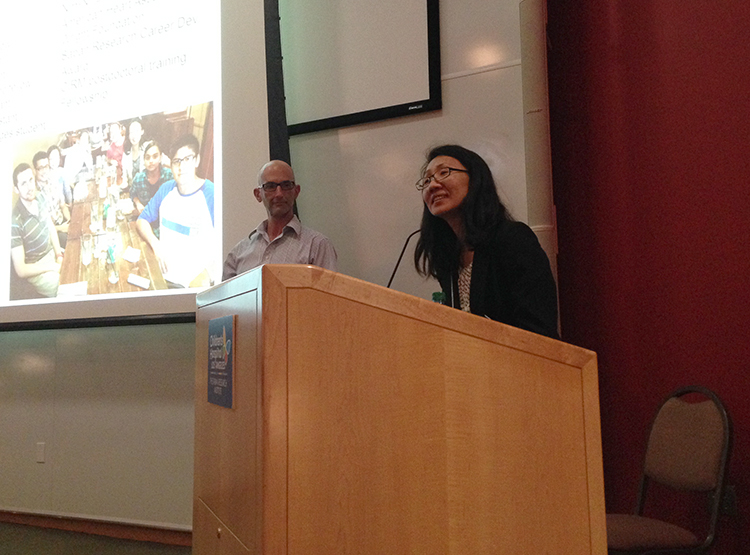
Researchers addressed the leading cause of death in the U.S. at the Los Angeles Area Cardiovascular Research Symposium and Research Award Reception, which brought together the region’s cardiovascular specialists to examine the developmental origins of heart health and disease.
Held at The Saban Research Institute of Children’s Hospital Los Angeles, the event was the first meeting of its kind since 1997, when the American Heart Association (AHA) disbanded local chapters in favor of regional affiliates.
“Many of us who used to participate in the annual symposium organized by the Los Angeles AHA affiliate remember the value of building collaborations among our local colleagues, and were sorry when that program ended,” said lead organizer Henry Sucov, PhD, professor of Cell and Neurobiology and Biochemistry and Molecular Biology at the Eli and Edythe Broad Center for Regenerative Medicine and Stem Cell Research at USC. “We are hoping to recreate that sense of community, and are grateful to the Western States affiliate of the AHA for supporting this effort.”
Ellen Lien, PhD, a principal investigator with USC Stem Cell and the Heart Regeneration Lab at The Saban Research Institute, and Yibin Wang, PhD, director of the Division of Molecular Medicine at the University of California, Los Angeles, also organized the event.
Lien hopes to make this an annual event “in order to continue interaction between LA’s numerous world-class cardiovascular experts.”
Throughout the AHA-sponsored symposium, 16 presenters discussed their research on topics including the engineering of cardiac pacemaker cells, the biological basis of congenital heart disease and the development of cellular imaging techniques capable of following individual cardiac cells through fetal growth.
“By bringing together top-ranked cardiovascular researchers, we hope to lead the development of advances in the diagnosis, prevention and treatment of heart disease,” said Brent Polk, MD, executive committee member of USC Stem Cell and director of The Saban Research Institute.
John Wood, MD, PhD, gave the keynote address on sickle cell disease as a model of premature vascular aging. He emphasized that cardiovascular disease research is becoming trans-disciplinary, thus making collaboration even more important.
An evening reception and poster session concluded the symposium, and attendees gathered in the Anita S. Watson Courtyard to honor AHA research award recipients as well as to discuss plans for next year’s event.
“This symposium showed that cardiovascular research is thriving in Southern California and that cell-based regenerative therapies for the heart are coming ever increasingly close to achieving fruition,” said David Warburton, MD, executive committee member of USC Stem Cell and director of Developmental Biology and Regenerative Medicine at The Saban Research Institute. “We thank the American Heart Association for its clarity of vision in helping us invent the future for cardiovascular therapies for kids as well as adults.”
